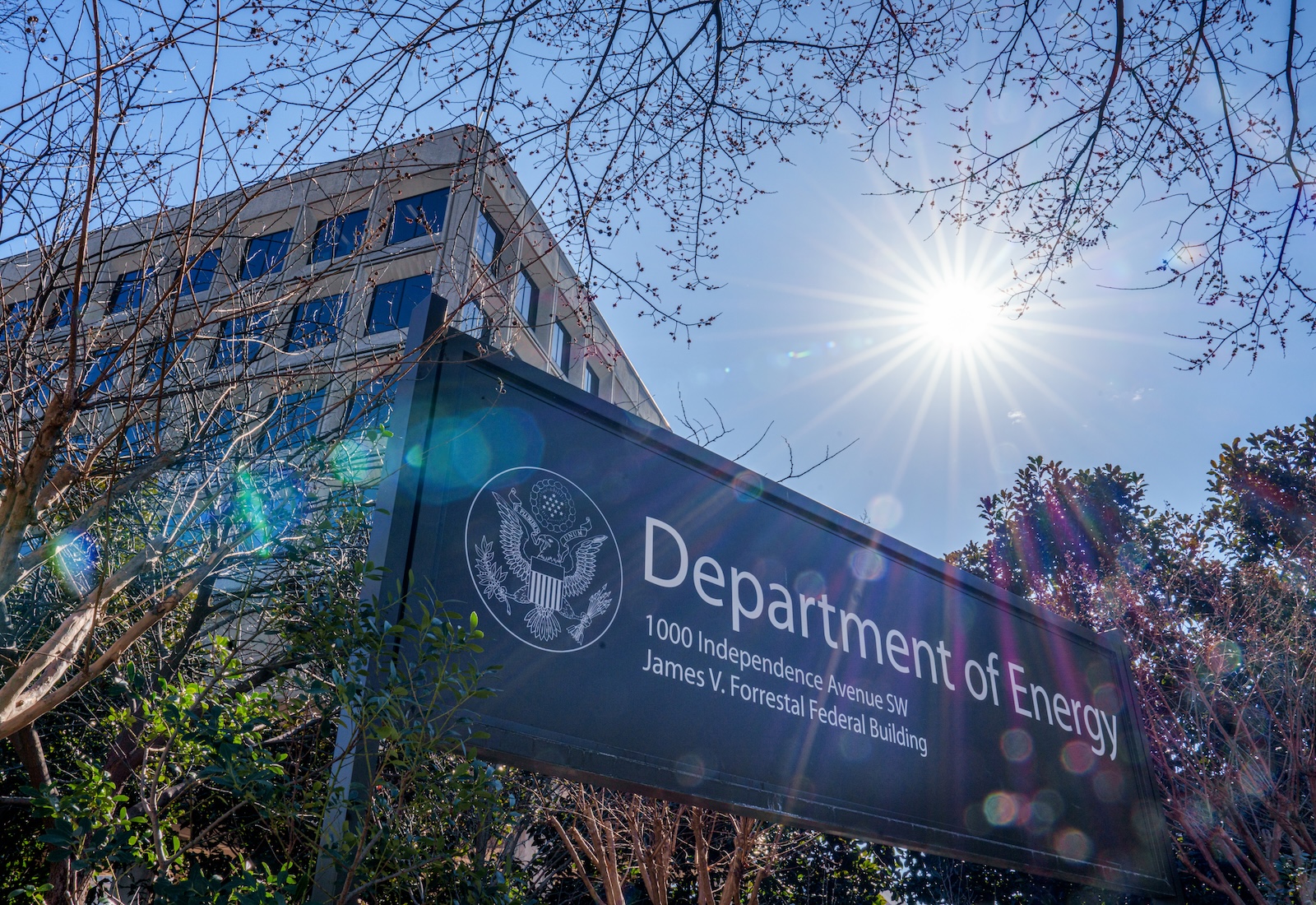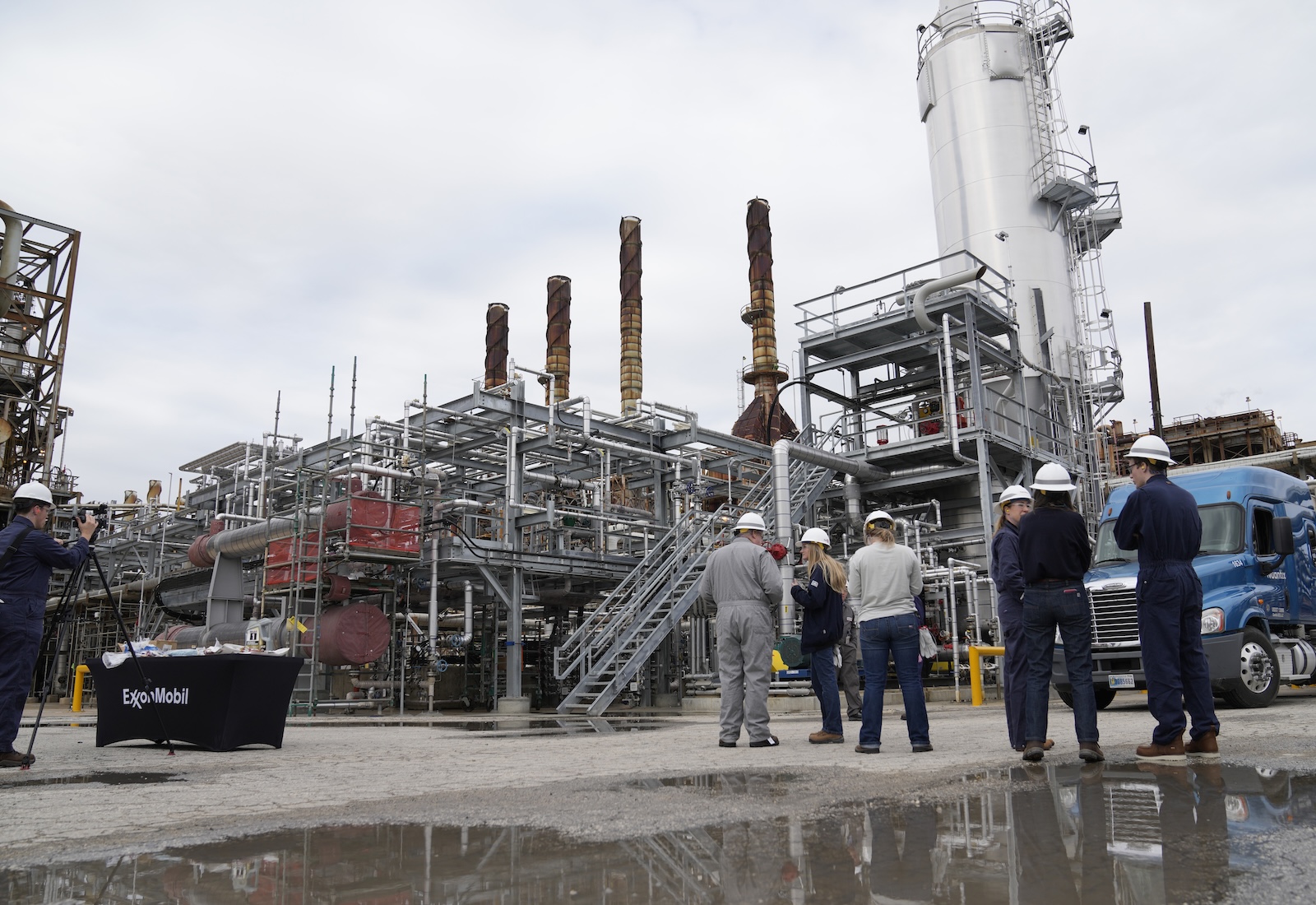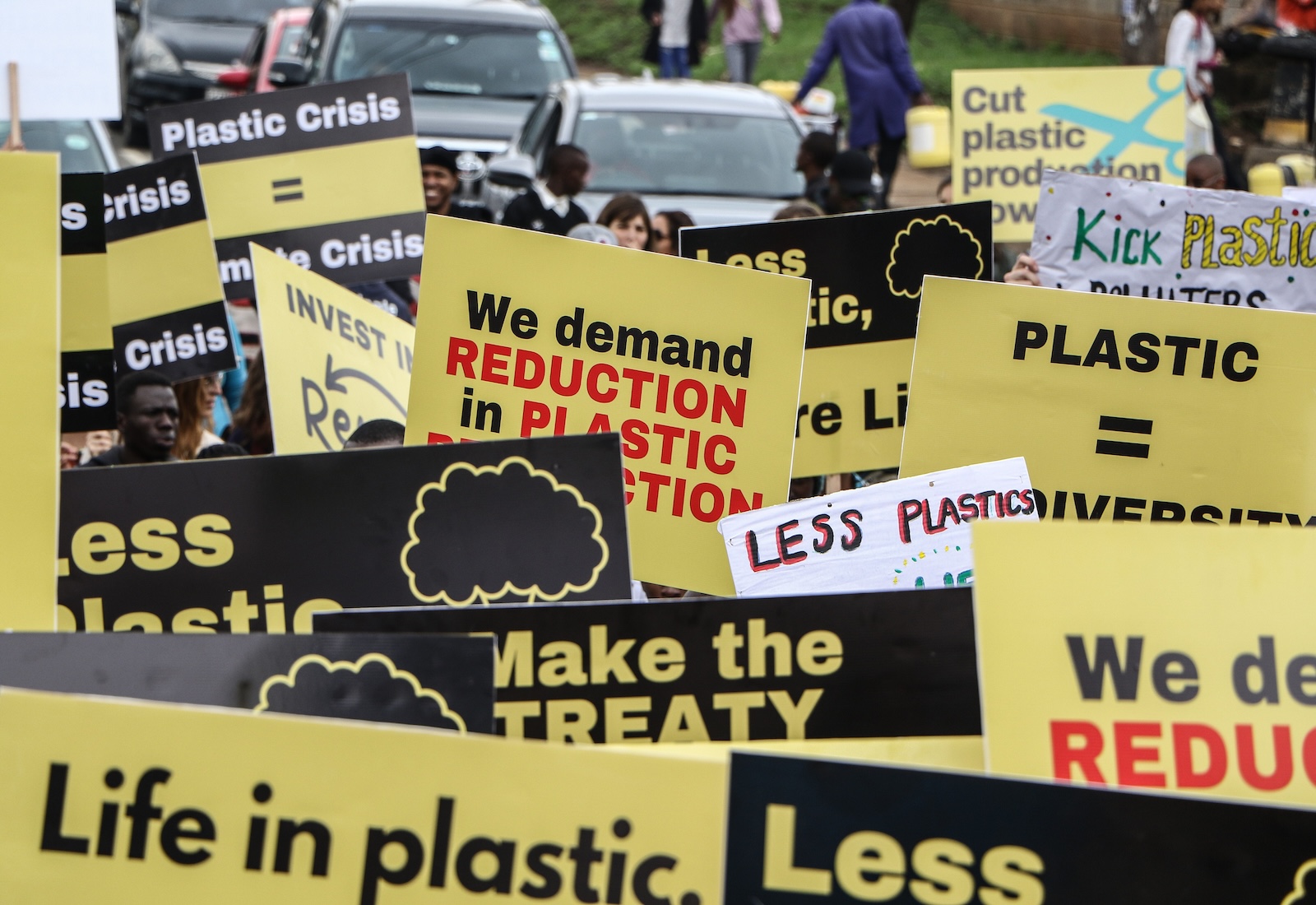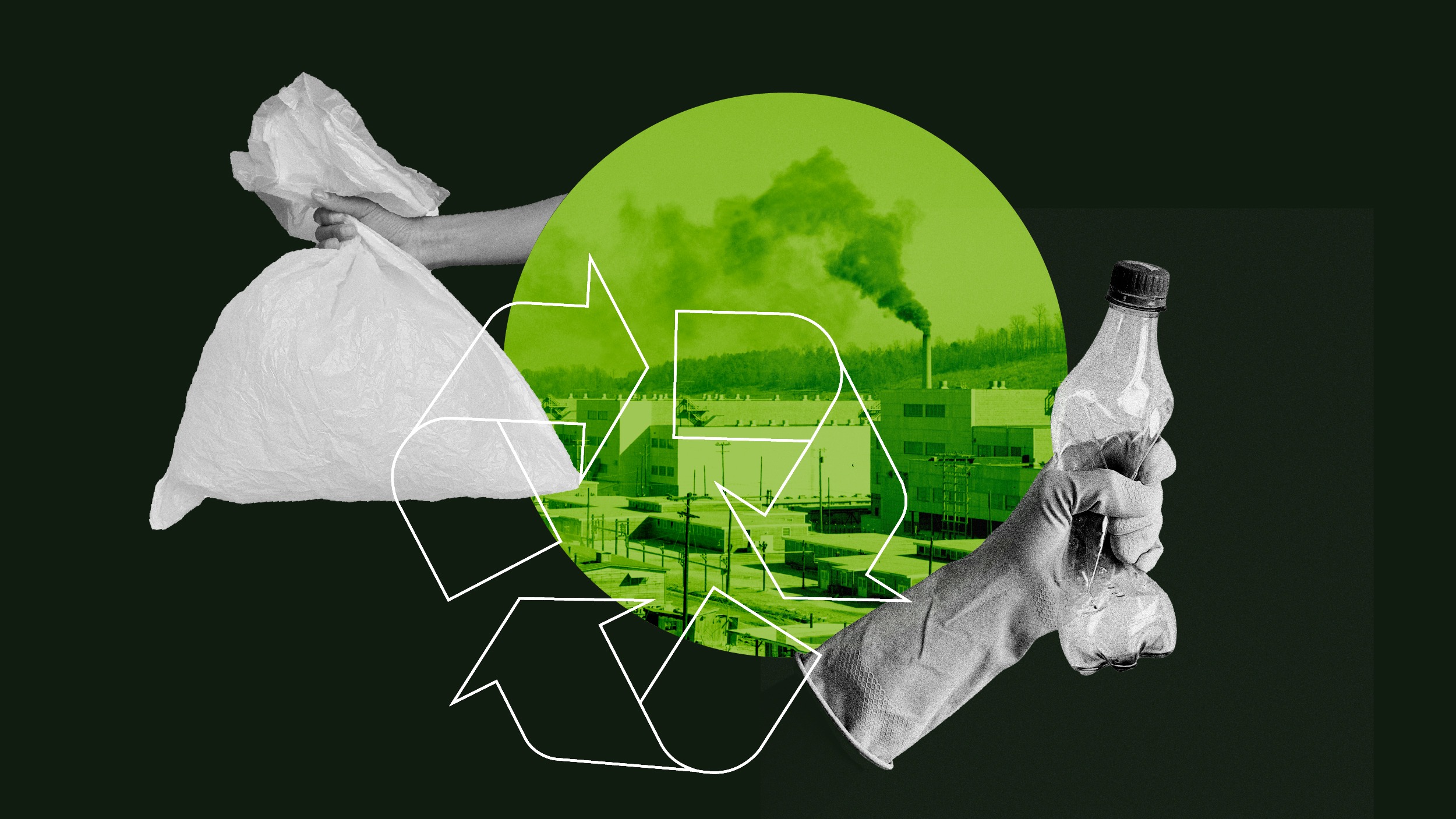This story is a partnership between Grist and ExxonKnews, a reporting project covering the fossil fuel industry.
Nearly five years ago, the United States Department of Energy, or DOE, began an unusual partnership with the country’s largest lobbying group for the plastics industry.
In a memorandum of understanding with a plastics industry trade association called the American Chemistry Council, or ACC, the Energy Department pledged to “collaborate on the development of innovative plastics recycling technologies and strengthen the domestic plastics supply chain.”
According to a press release, the collaboration would involve research into “novel collection technologies” to keep plastics out of waterways, as well as new types of plastic that are “inherently designed for recycling.” But perhaps the most significant part of the agreement referred to research on so-called “advanced recycling” — a suite of technologies also known as “chemical recycling” that are favored by the ACC and other industry groups, and intensely scrutinized by environmental advocates.
Chemical recycling refers to processes that use high heat, pressure, or solvents to break plastics into their constituent building blocks, so they can — in theory — be turned into new plastic products again and again. This differs from conventional “mechanical” recycling, in which plastics are shredded or melted before being turned into new products. Under fire for the failure of conventional recycling to mitigate the plastic pollution crisis, the petrochemical industry has turned to chemical recycling, heavily promoting it in public communications and to state legislators despite difficulties getting it to work at a large scale. Environmental groups and many scientists say the technology will never work, and that it’s a diversion from calls to reduce the production of plastic, which is made out of oil and gas.
The agreement’s initial five-year term is scheduled to expire early this month, just days into President Trump’s second term.
According to Ross Eisenberg, vice president of the ACC’s plastics division, the agreement never amounted to much. “The onset of COVID-19 postponed discussions, and with the subsequent change in administration, no work was conducted” under the memorandum of understanding, Eisenberg said.
But public records indicate the Department of Energy has collaborated with the plastics industry to fund and promote chemical recycling research and projects in the years since the agreement was signed. Scientists and environmental advocates say that the department’s partnerships with the industry lack transparency and represent a conflict of interest. The ACC, whose members include dozens of petrochemical companies that stand to benefit from the rapidly increasing production of plastics, has continued to lobby the department — which has a responsibility to work on behalf of the public — every year since the memorandum was announced.
The ACC sought “to influence the policy agenda of the DOE and move it toward funding chemical recycling research and policy development as a priority over other issues,” said Lee Bell, a policy adviser for the nonprofit International Pollutants Elimination Network. “It is clearly not an appropriate relationship for an industry lobby group to have with a department charged with the expenditure of millions in public funds.”
Tony Karuma / AFP via Getty Images
The DOE’s chemical recycling initiatives are part of a long series of government attempts to deal with the overwhelming amount of plastic waste the country generates — and fails to recycle. As of 2019, the U.S. produced 44 million metric tons of plastic waste and recycled only 5 percent of it, according to the Energy Department. The rest was sent to landfills or incinerators, or wound up as litter in the environment. In a July 2024 report, the Biden administration said plastic pollution was “one of the most pressing and consequential environmental problems in the U.S. and around the globe.”
The Energy Department’s role in U.S. plastics strategy has mainly been to support research, much of it on recycling and the cleanup of existing plastic waste. In 2019, it launched a “Plastics Innovation Challenge” to “accelerate energy efficient technologies that reduce plastic waste in oceans and landfills.” A month later, the department held a workshop to discuss “Plastics for a Circular Economy” — including a review of the challenges and possibilities of chemical recycling. Workshop attendees included representatives of various members of the ACC, including ExxonMobil, Shell, and Dow — but no environmental organizations or citizen groups.
According to the ACC’s Eisenberg, after the Plastics Innovation Challenge was announced, “American Chemistry Council members spoke with DOE to explore ways to support the initiative from a technology perspective, leading to the development of a memorandum of understanding in February 2020.” The agency’s partnership with the ACC was described in a 2020 press release as an opportunity to “position the U.S. for global leadership in advanced recycling technologies, including plastic-to-energy conversion” — meaning the conversion of plastic waste back into fuel instead of new plastic products.
Daniel Simmons, then the DOE’s assistant secretary for energy efficiency and renewable energy, praised the industry and its products during the memo’s public signing. “What does energy efficiency and renewable energy have to do with plastics recycling? It’s one: because plastics are awesome,” he said at the time. “Obviously plastics can result in greater energy efficiency, food efficiency, a whole number of wonderful things. … The problem with plastics is not that they are bad, but because they are so good, and how do we make them better for the future?”
Environmental groups were immediately skeptical. Judith Enck, president of the nonprofit Beyond Plastics and a former regional administrator for the Environmental Protection Agency, said she had “never seen this before,” referring to a multi-year agreement between a government agency and what is essentially an “advocacy lobbying group.” More typically, she said, if the government is interested in supporting a particular type of research it can funnel money to state agencies or conduct independent research through its network of national laboratories

David Ake / Getty Images
Nearly a year after the agreement was announced, the memo had still not been posted publicly. In 2021, the nonprofit Natural Resources Defense Council, or NRDC, filed a public records request for the memo and other communications between the DOE, ACC, and any other outside parties relating to chemical recycling and the department’s “Plastics Innovation Challenge.” The request was filed under the Freedom of Information Act, which entitles the public to access any federal agency records unless they are specifically exempt from public view.
Daniel Rosenberg, director of federal toxics policy at the NRDC and the author of that request, said the group is still seeking answers about how the Department of Energy’s focus on chemical recycling came about — and the role industry players continue to have in shaping the department’s approach to managing plastic pollution.
“There’s no transparency on how DOE is developing their policies around plastic waste,” said Rosenberg. “They seem very much in line with the industry agenda that’s clearly formalized in the memorandum of understanding.”
It wasn’t until six months later that the DOE sent the NRDC the official memo — but not any related documents answering the group’s other questions. Last year, the NRDC sued the Energy Department for failing to respond to its requests and repeated outreach. “They’ve done a pretty good job over the last five years of keeping public scrutiny at bay,” said Rosenberg, who has since filed a second freedom of information request with the agency. “What DOE does on plastic, how they spend their research money, the solutions they’re promoting, all of which is consequential — we’re just trying to get to the bottom of how it all came about and how it’s continued to develop.”
The lawsuit is ongoing, but the DOE has agreed to process hundreds of documents per month regarding the original records request and deliver relevant documents to the NRDC. Though a January status report to the court shows the department has delivered more than 200 pages of documents to the NRDC since the lawsuit began, Rosenberg said he’s so far received a “small fraction” of the communications he’s sought. A public records request filed on behalf of ExxonKnews and Grist in October has not yet yielded any documents.
Even if the formal agreement between the DOE and the ACC never got off the ground, as the lobbying group claims, the Energy Department’s backing of chemical recycling research suggests that the agency has embraced the industry’s characterization of the plastic waste problem as an issue that can be solved through innovation. By January 2026, the department is set to have spent $10 million funding the “Chemical Upcycling of Waste Plastics,” a center for chemical recycling research and academic collaboration that includes 20 industrial partners, including ACC member companies and another plastic industry trade group that sits on the center’s “industrial advisory board.” The DOE’s latest “Strategies for Plastic Innovation” report calls for more research into chemical recycling, deeming the technologies “crucial to begin addressing the global plastic crisis.”

Melissa Phillip / Houston Chronicle via Getty Images
Last year, as part of an initiative by the Biden administration to “decarbonize energy-intensive industries,” the DOE awarded a grant of up to $375 million to a controversial chemical recycling project from the Eastman Chemical Company, an ACC member. Eastman has since asked the Texas Commission on Environmental Quality to permit the release of an additional 114 tons of annual air pollution at its facility in Longview, Texas, where the new project is being built.
“These are extraordinary amounts that are going to high-priority serial violators of the Clean Air Act,” said Cynthia Palmer, senior analyst for petrochemicals at the nonprofit Moms Clean Air Force. At its Kingsport, Tennessee, petrochemical refinery, where Eastman’s other chemical recycling facility is housed, the EPA documented high-priority violations of the Clean Air Act every quarter of the past three years.
Working with the Energy Department was just one prong in the ACC’s campaign to legitimize chemical recycling. In the U.S., the group has also spent years lobbying state legislatures to reclassify chemical recycling as a manufacturing process, rather than waste disposal. Two dozen states have passed such reclassification bills, as of last year.
The ACC has also promoted the inclusion of chemical recycling in the United Nations’ global plastics treaty, which was scheduled to be completed last December but has been stalled by disagreements over its scope. Provisions for chemical recycling haven’t yet been incorporated into the agreement’s draft text, but experts say the compact between the ACC and the Energy Department was part of the industry’s attempt to change that by creating research to demonstrate that chemical recycling is environmentally sound.
Scientists have criticized some of the specific research conducted by the Energy Department’s national laboratories with ACC funding, like a life cycle analysis from the Argonne National Laboratory showing reduced carbon emissions from chemical recycling, compared to other waste management options. The ACC has cited this study in public communications arguing against plastic reduction.
In a 16-page rebuttal to the study shared with ExxonKnews and Grist, Bell, with IPEN, called out the study’s use of “nonreproducible data based on ‘discussions’ with industry.”
Neil Tangri, research and policy director for the nonprofit Global Alliance for Incinerator Alternatives, said the study built in “wildly unrealistic assumptions” about the possibility of substituting pyrolysis oil — a main output from the most popular chemical recycling method — for the current fossil fuel feedstock, naphtha. He also criticized the study for using confidential data that is “not transparent” and “not replicable”: “That is completely inimical to the way science works,” he said.
Palmer, of Moms Clean Air Force, added that such life-cycle analyses don’t take into account significant environmental and public health concerns caused by plastic production or chemical recycling, making them “highly misleading.”

James Wakibia / Sopa Images / LightRocket via Getty Images
“National laboratories should not be aiding and abetting the deceptive practices of the petrochemical industry,” Tangri said.
In recent months, the ACC and several of its member companies were sued by state and local governments and individuals, arguing that the industry deliberately misled the public about the viability of mechanical and chemical recycling despite knowing it would never be able to manage the waste generated by growing plastic production.
Jeffrey Seay, a chemical engineering professor at the University of Kentucky, said the prospects for some sort of chemical recycling breakthrough — the kind industry groups imply is just around the corner — are slim. “I’d love to tell you I’ve seen that research, but I haven’t,” he said. “I think it’s something worthwhile to be looking at, but I’m just not of the opinion that there’s a technology on the horizon that’s going to allow us to consume plastic the way we have always consumed plastic.”
Seay added that, contrary to industry claims, he’s “not aware of a technology where you can just dump a bunch of mixed plastic in there and get clean polymers out on the other side. There’s a lot of research going on in this area … but to commercialize that, you’d be decades away.”
A 2023 peer-reviewed study conducted by DOE also acknowledged that three chemical recycling technologies — glycolysis, hydrolysis, and methanolysis — are “an order of magnitude” more polluting and energy-intensive than conventional recycling.
The Biden administration Energy Department declined to comment on the status of its memorandum of understanding with the ACC, citing “the upcoming administration transition.” The agency did not respond to additional requests for comment after Trump’s inauguration.
As a newer, bolder Trump administration returns to office with fracking executive Chris Wright set to helm the DOE, Enck and other advocates are skeptical — but still hoping — that the Trump DOE will stop propping up the plastic industry altogether.
“If the DOE was really interested in energy savings, they should be putting resources into waste reduction, refill, and reuse,” said Enck, of Beyond Plastics.
Rosenberg, of the NRDC, expressed concerns that the Trump administration could continue working with the industry behind the scenes. Either way, he said, the DOE owes Americans clarity about the nature of its work on chemical recycling.
“Whether it’s the Trump administration or the Biden administration, I don’t really care — the public should have transparency on what this department is doing on this issue, which has such serious implications for pollution and health and environment,” he said. “We’ll just keep pursuing it.”
Editor’s note: ExxonKnews is a reporting project of the Center for Climate Integrity, an advocacy group that provides research and tools to help communities hold oil and gas corporations accountable. The center’s political staff was not involved in producing this story.
Source link
Joseph Winters grist.org


